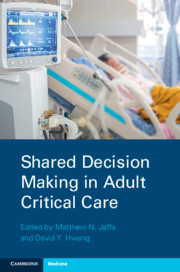Book contents
- Shared Decision Making in Adult Critical Care
- Shared Decision Making in Adult Critical Care
- Copyright page
- Dedication
- Contents
- Contributors
- Preface
- Chapter 1 When Does Shared Decision-Making Apply in Adult Critical Care?
- Chapter 2 How Much Does the Family Want to Be Involved in Decision-Making?
- Chapter 3 Show Me the Data
- Chapter 4 Communication Skills for Critical Care Family Meetings
- Chapter 5 The Do-Not-Resuscitate Order
- Chapter 6 The Do-Not-Intubate Order
- Chapter 7 Prolonged Ventilator Dependence for the Pulmonary Patient
- Chapter 8 Renal Replacement Therapy
- Chapter 9 Shared Decision-Making during Extracorporeal Membrane Oxygenation
- Chapter 10 Hypoxic–Ischemic Brain Injury after Cardiac Arrest
- Chapter 11 Decompressive Craniectomy for Stroke Patients
- Chapter 12 Decompressive Craniectomy for Traumatic Brain Injury Patients
- Chapter 13 Severe Traumatic Spinal Cord Injury
- Chapter 14 Potentially Inappropriate Treatment and Conscientious Objection
- Chapter 15 Shared Decision-Making in Emergent Situations
- Chapter 16 Advance Directives
- Chapter 17 Care of the Unbefriended Patient
- Chapter 18 The Role of Palliative Care in the Intensive Care Unit
- Chapter 19 Measuring and Evaluating Shared Decision-Making in the Intensive Care Unit
- Chapter 20 Brain Death Discussions
- Index
- References
Chapter 20 - Brain Death Discussions
Published online by Cambridge University Press: 27 May 2021
- Shared Decision Making in Adult Critical Care
- Shared Decision Making in Adult Critical Care
- Copyright page
- Dedication
- Contents
- Contributors
- Preface
- Chapter 1 When Does Shared Decision-Making Apply in Adult Critical Care?
- Chapter 2 How Much Does the Family Want to Be Involved in Decision-Making?
- Chapter 3 Show Me the Data
- Chapter 4 Communication Skills for Critical Care Family Meetings
- Chapter 5 The Do-Not-Resuscitate Order
- Chapter 6 The Do-Not-Intubate Order
- Chapter 7 Prolonged Ventilator Dependence for the Pulmonary Patient
- Chapter 8 Renal Replacement Therapy
- Chapter 9 Shared Decision-Making during Extracorporeal Membrane Oxygenation
- Chapter 10 Hypoxic–Ischemic Brain Injury after Cardiac Arrest
- Chapter 11 Decompressive Craniectomy for Stroke Patients
- Chapter 12 Decompressive Craniectomy for Traumatic Brain Injury Patients
- Chapter 13 Severe Traumatic Spinal Cord Injury
- Chapter 14 Potentially Inappropriate Treatment and Conscientious Objection
- Chapter 15 Shared Decision-Making in Emergent Situations
- Chapter 16 Advance Directives
- Chapter 17 Care of the Unbefriended Patient
- Chapter 18 The Role of Palliative Care in the Intensive Care Unit
- Chapter 19 Measuring and Evaluating Shared Decision-Making in the Intensive Care Unit
- Chapter 20 Brain Death Discussions
- Index
- References
Summary
In 1959, shortly after the invention of positive pressure ventilation, Pierre Mollaret and Maurice Goulon published the first description of what would eventually be referred to as “brain death” in their manuscript “Le Coma Depassé.”1,2 Nearly a decade later, a committee commissioned by Harvard Medical School expanded on Mollaret and Goulon’s work and described their acceptance of the use of neurologic criteria to declare death when a person is unreceptive and unresponsive, does not move or breathe, has absent reflexes, and has an isoelectric electroencephalogram.2,3 In the ensuing 50 years, the use of neurologic criteria to declare death has become medically and legally accepted as death throughout much of the world.4,5
- Type
- Chapter
- Information
- Shared Decision Making in Adult Critical Care , pp. 179 - 188Publisher: Cambridge University PressPrint publication year: 2021
References
- 1
- Cited by

